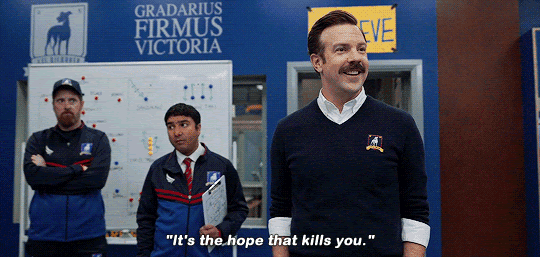Last fall Kyle and I binge-watched Ted Lasso, the Apple TV series about an American football coach who comes to the UK to coach true “football.” While there is definitely some PG-13+ content as the seasons progress, there are also some powerful one-liners and inspirational monologues from Coach Lasso. In the first season finale, Lasso gives an opening game speech to his players, challenging them to rethink a mantra he had heard swirling around the media:
It’s the hope that kills you.
How true can that be? Hope can feel so vulnerable, and disappointment painful. A miscarriage. Negative pregnancy test. Job loss or yet another automated rejection email. A “let’s just be friends” text or an empty inbox. A painful marriage. Infidelity. Betrayal. etc.etc.etc. The longer we live, and the more that we walk alongside others, we see the wide array of disappointment and pain that exists in this broken world.
We see disappointed hopes in the Easter story as well. Mary Magdalene weeps at the empty tomb, believing not only that her close friend and hoped-for Savior had died, but also that someone had taken His body from the tomb (John 20:11-15). Two men on the road to Emmaus confess that they “had hoped that [Jesus] was the one to redeem Israel” (Luke 24:21), but they had just seen Him brutally crucified.
Their Hope had been killed. Or so they believed.
Going back to the Ted Lasso scene, Lasso shares that he didn’t like the statement. He acknowledged the need for hope and said, “I actually think it’s the lack of hope that kills you....I believe in belief.” He then pointed to the infamous yellow sign with the word ‘Believe’ hanging on the wall of their locker room, and asked his team, “Do you believe in miracles?”
While this inspired the team and can feel heartwarming, this monologue begs another question: What are we actually believing in? Lasso alludes to believing in miracles, but what does that actually mean? That the team could win this game? If so, is that the highest, meaning-giving hope they could attach themselves to? What happens if they lose? Or even if they win, how long would that hope last, and what meaning would it give to their lives after the winners’ high fades?

Celebrating Easter without understanding the true meaning of the holiday is odd if you think about it. We are celebrating so much more than the start of spring, a cute bunny, or a delicious brunch.
On Good Friday, we remember that Jesus sacrificed Himself for us on the cross, taking the penalty of our sin, and dying in our place.
On “Holy Saturday,” we remember that He is there in the silence and the waiting.
On Easter Sunday, we remember that He did not just die — He resurrected, and we live in light of this truth. Death, “the final enemy” (1 Corinthians 15:26), has been defeated. Although we still experience its impact here, we know that death will not have the final say. We live in light of not only Christ’s resurrection but also His final return.
Hopelessness comes when what we have tethered our hope to is either gradually or suddenly lost. Usually, this hope is connected to our future, whether that be a certain relationship, financial status, stability in a job, a child, a living situation, etc. We believe that this thing we are hoping in will provide what we long for years down the line.
In Walking with God Through Pain and Suffering, Tim Keller wrote,
“Human beings are hope-shaped creatures. The way you live now is completely controlled by what you believe about your future.”
If you do not know Christ personally, I pray that this Easter lends you to asking the hard and necessary questions. Christ loves you and died for you. In your own power, you cannot earn salvation, and neither can I. His resurrection means that He has conquered sin and death once and for all, and through Him alone you are offered eternal life — and that begins with a relationship with Him now, purpose, hope, and a future. If you’re wrestling with the reality of a resurrection, I’d highly recommend Is Easter Unbelievable?: Four Questions Everyone Should Ask about the Resurrection Story by Rebecca McLaughlin. It’s only $1.99 on Amazon and has 61 pages of well-researched and well-written explanations of why we can believe in Jesus’ resurrection.
If you are a Christian, are you living as if you have no hope? That’s a question I have to ask myself too, because quite honestly, the answer is often yes. My hope is easily and wrongly attached to good yet fleeting things. Return, return, return to Him. No other thing truly satisfies. We know from Hebrews 6:19-20 that “we have this as a sure and steadfast anchor of the soul, a hope that enters into the inner place behind the curtain, where Jesus has gone as a forerunner on our behalf…” For a short study on what the resurrection really means for the life of the believer, I would highly recommend She Reads Truth’s A Living Hope daily reading guide here. I used this after Easter last year, and it reminded me of so many powerful truths in Scripture about the hope that we have in light of Christ’s resurrection.
“Now may the God of hope fill you with all joy and peace in believing, so that by the power of the Holy Spirit you may abound in hope.”
Romans 15:13
Happy Easter. xo




Thank you! Happy resurrection!
This is beautiful, Alecia. And I love the falling plates video! A classic for me :)